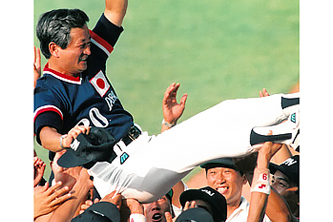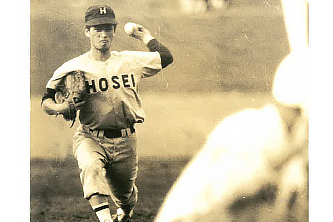Notices
Mr. Masatake Yamanaka, Chairman of the All Japan Baseball Association, General Manager of the Samurai Japan Reinforcement Headquarters of the Baseball Council of Japan, Vice President of the Asian Baseball Confederation
- October 27, 2020
Profile.
Mr. Yamanaka Masatake
Born in Oita Prefecture in 1947, Mr. Yamanaka graduated from the Department of Economics in 1970 and joined Sumitomo Metal Industries (now Nippon Steel Corporation). After working as a baseball player and manager, he coached the Japanese national baseball team at the 1988 Seoul Olympics and the 1992 Barcelona Olympics. 1994-2002: Baseball coach and professor in the School of Engineering at TUAT. 2003-2010: Senior Managing Director of the Yokohama Bay Stars, Inc. 2010-2014: Specially Appointed Professor at TUAT. 2016: Professor in the School of Engineering at TUAT, In 2016, he was inducted into the Baseball Hall of Fame.
Baseball is the finest game that enriches one's life, and it is my mission to pass it on to the next generation.
Masatake Yamanaka left behind a record of 48 wins as a pitcher in the Tokyo Rokugaku University baseball team, a record that is said to never be broken. After graduation, he went on to win numerous championships and medals at home and abroad as a player and manager. He says that we can learn a lot from baseball, and in order to pass this on to the next generation, we first need to change the leadership side of the game.
Spreading a sustainable baseball culture through thorough sportsmanship
Having grown up in the "spirit" of Japanese baseball, when I first came into contact with world-class play and practice around the age of 40, it was truly an eye-opening experience for me. That was the beginning of the second stage of my baseball career, and I have been working to internationalize baseball in Japan.
The All Japan Baseball Association, of which I am currently the president, is the representative organization for amateur baseball in Japan and is the contact point for the "Samurai Japan" (all categories, including professional, adult, college, and women's) representing Japan in the Olympics and international tournaments. It is also working to promote a "sustainable baseball culture" in order to curb the "shift away from baseball" due to the declining birthrate and diversification of sports options.
Sports are essentially about respecting others, learning good manners, and improving one's aspirations and human skills through fair and honest competition in accordance with rules. It is precisely because it is a "game" in which people participate voluntarily, rather than as a class or as training, that it can be taken seriously, and there is much to be gained from it.
However, in the world of baseball, the prewar tendency of victory supremacy and superiority still remains. Therefore, I believe it is important to first have the leaders properly understand sportsmanship and convey the fun of baseball to the children who will be responsible for the future. At the same time, I would like "baseball people" at the top to communicate the value and appeal of baseball in their own words.

Mr. Yamanaka being lifted up by players after winning the bronze medal at the 1992 Barcelona Olympics
I am still proud of my records and achievements in college baseball.
When I was a child, baseball was associated with the Tokyo Six Universities, and I entered Hosei University with the desire to pitch at Jingu Stadium just once.
Along with my record of 48 wins (still the most of all time), I am proud of the fact that I was able to pitch the first game of each card from the fall of my freshman year until my retirement in the fall of my senior year. These numbers and accomplishments have been a great source of encouragement for me after graduation, leading to opportunities to become a mentor and coach of the national team.
I think I also enjoyed campus life more than any other member of the baseball team, as we enjoyed casual conversation at my classmates' lodgings after class and exchanged information about exams.
After playing for a few years, I decided to become an asset to the company and got a job at Sumitomo Metals, but in my second year, Reiichi Matsunaga, the coach from my college days, became the team manager, and I ended up continuing to play baseball until I was 30. I worked there for the next four years, and when I had a full grasp of how society works, I was faced with a choice: coach a baseball team or manage a pipe factory in Saudi Arabia. Since then, he has worked his way up through the national team, university, and the professional ranks, and has had a unique career in the baseball world.

Mr. Yamanaka in his college days. He won three championships as a player and seven as a manager in the Rokugaku Daigaku Baseball Tournament.
Leaders need to have an attitude of self-improvement
My experience as a baseball coach has made me think about leadership in addition to what sports are all about.
As former French national soccer coach Roger Lemaire said, "When you stop learning, you have to stop teaching. If you show the players that you are making an effort to improve yourself, rather than pulling them to "follow you," they will feel something and follow you. Such a team will definitely create a sense of trust.
University students have enough ability to think, and they are no longer at the stage where they need to be told to "do this" or to respond in a loud voice. The role of the coach is to be prepared to answer questions when asked by the players and to give hints when they are not sure. Therefore, I do not use the term "pupil. In fact, I have learned more from my students than they have from me.
Sports provides endless learning opportunities
I always say "baseball is a thinking sport," and this is something I learned when I was in college. In an era without the advanced data analysis that we have today, Manager Matsunaga told me, "You don't have to attend practice, but go watch Waseda's game against Waseda on the next card," and I studied each player's strategy behind the net.
He told me, "You don't have to practice, but go watch Waseda's game against Waseda on the next card." I would study each player's strategy behind the net. This endless learning experience is the appeal of baseball, and I believe it is my mission to pass this on to the next generation.
Since 2000, the number of faculties and departments with the word "sports" in their name has increased, including Hosei, and the government has set a goal of expanding the size of the sports market to 15 trillion yen by 2025, and the various values of sports are now widely recognized.
Students who have devoted themselves to sports in college or studied sports have a variety of options besides being a player, such as management, journalist, trainer, or equipment manufacturer. We hope that you will learn many things from sports and apply them to your life after graduation.
(First published in the August/September 2020 issue of Hosei, a public relations magazine)

